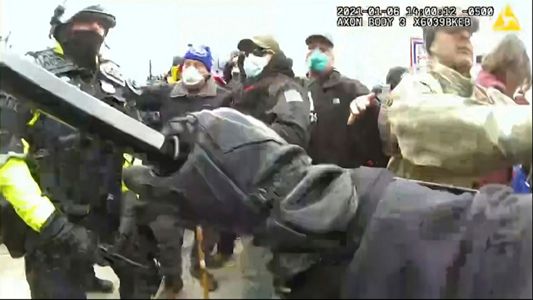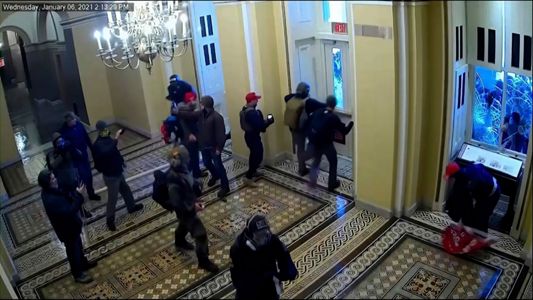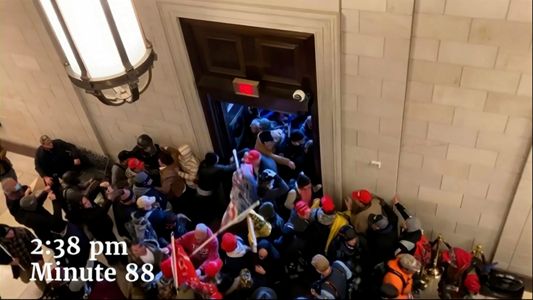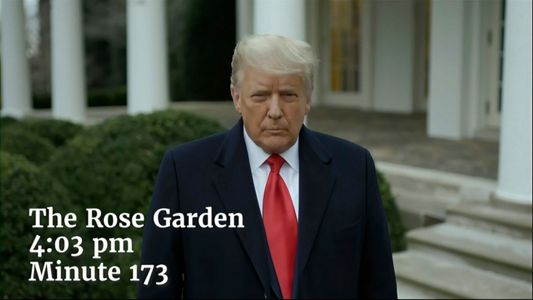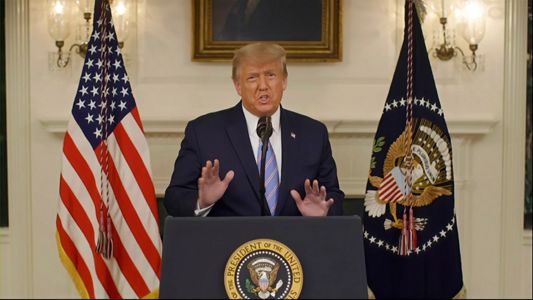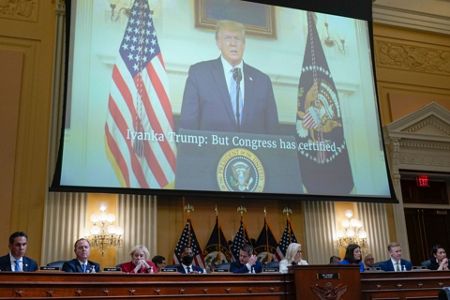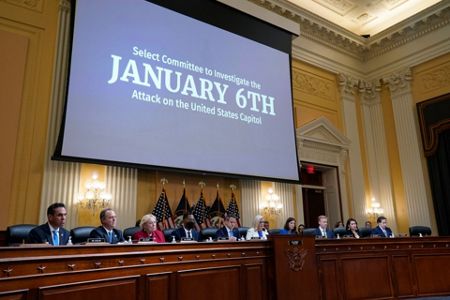WASHINGTON (AP) — Turns out, Jan. 6 was more than just the day when a mob stormed the U.S. Capitol.
It was the culmination, but also the start, of an enduring challenge for American democracy.
The House committee investigating Jan. 6, 2021 has shown how the deadly Capitol attack was sparked months earlier on Election Night 2020, when the incumbent president, Donald Trump, refused to admit he was trailing Joe Biden, and instead spewed false claims of voter fraud and declared himself the winner.
The defeated president spent the next eight weeks orchestrating an unprecedented attempt to overturn the election results and summoned supporters to Washington on Jan. 6 to finish the job.
And even after the blood, mayhem and deaths at the Capitol, Trump still refused on Jan. 7 to say the words that all those around him knew needed to be said: the presidential election was over.
The Jan. 6 committee cannot charge anyone with crimes, but it has produced a public record for history, one that's still being written. It is showing how the insurrection at the Capitol is testing the resiliency of the nation’s democracy.
As Trump contemplates another White House run, he has denounced the proceedings as “so many lies and misrepresentations.”
Rep. Liz Cheney, a fellow Republican who is vice chair of the panel, said the case against her party's president is being made not by Trump's political enemies, but rather his own friends, campaign officials, people who worked for him and his own family.
“They have come forward and they have told the American people the truth,” Cheney said.
Here’s what we know from eight summer hearings of the House Jan. 6 committee.
‘TEAM NORMAL’ WARNS TRUMP NOT TO CLAIM ELECTION VICTORY
Election Night did not look good for incumbent Trump, as battleground states he had won four years earlier began to fall to Biden.
Campaign manager Bill Stepien testified this summer that it was no time to declare victory. But “Team Normal,” as some of Trump's more experienced political aides called themselves, was no match for Rudy Giuliani, the president's personal lawyer who encouraged Trump to fight.
“This is a fraud on the American public,” Trump said in an election night speech. “Frankly, we did win this election.”
For the next eight weeks Trump battled in court challenging the election results. When one judge after another rejected or declined to take up Trump's claims of voter fraud, the defeated president latched on to another plan, from a conservative law professor John Eastman, to challenge the results when Congress met to certify the election, scheduled for Jan. 6.
Trump met privately with members of Congress who would reject the election results from their states, and encouraged hundreds of electors to send Congress his name as the winner, rather than Biden.
But “over and over again,” Cheney said, the president was told there was no voter fraud that could have tipped the election.
“This is bull—-,” former Attorney General Bill Barr testified that he told the president.
When told of Barr's interview to an AP reporter declaring there was no fraud, the president threw his lunch in the Oval Office dining room. “There was ketchup dripping down the wall,” testified former White House aide Cassidy Hutchinson, who helped the president's valet mop it up.
'WE’RE GOING TO WALK DOWN TO THE CAPITOL'
The committee revealed new evidence that the attack on the Capitol was not a spontaneous event but one set in motion by the president's actions.
Summoning supporters to Washington for a “big” rally Jan. 6, Trump spoke before the crowd at the Ellipse outside the White House and sent them marching to the Capitol.
“We're going to walk down — and I'll be there with you,” Trump told the crowd. “We're going to walk down to the Capitol.”
The committee revealed in text messages from rally organizer Kylie Kremer that there were plans for a second stage to be set up outside the Capitol, which sits across from the Supreme Court.
Alarmed, White House counsel Pat Cipollone scrambled to prevent Trump from going to the Capitol, desperately worried that if he did, it would be seen as the president interfering with the U.S. election.
“We’re going to get charged with every crime imaginable if we make that movement happen,” Hutchinson recalled Cipollone telling her.
After Trump left the rally stage, he had a confrontation with the security agent driving the presidential SUV, demanding to be taken to the Capitol, Hutchinson said. It's an account that the Secret Service denies. But the service has not publicly testified about it as Hutchinson has under oath.
Instead, the security detail drove Trump back to the White House, where an aide told him about the riot at the Capitol.
“Within 15 minutes of leaving the stage, President Trump knew that the Capitol was besieged and under attack,” Cheney said.
And then Trump went into the Oval Office dining room and for the next three hours refused to call off the mob, watching it all on TV.
“You know, Commander in Chief, you got an assault going on on the Capitol of the United States of America. And there’s nothing? No call? Nothing? Zero?” testified Gen. Mark Milley, the chairman of the joint chiefs of staff.
“For hours, Donald Trump chose not to answer the pleas from Congress, from his own party, and from all across our nation to do what his oath required," Cheney said. "He refused to defend our nation and our Constitution.”
THE ATTACK: ‘IT WAS CARNAGE, IT WAS CHAOS’
From the opening hearing, the Jan. 6 committee showed that the attack on the Capitol was not some visit by tourists, as some Trump allies have since maintained, but a gruesome, grisly, deadly fight.
U.S. Capitol Police officer Carolyn Edwards testified about the “war scene” as she stood on the Capitol's West Front trying to push back the mob — some armed with shields, flag poles, stun guns, bear spray, and guns.
“It was carnage, it was chaos," she said. "I was slipping in people's blood.”
The panel showed how extremist Oath Keepers and Proud Boys, whose leaders now face rare sedition charges, had been planning for Jan. 6 for weeks, including a stunning parking garage meeting the night before filmed by a documentarian who testified before the committee.
Among the more than 100 officers injured that day some have sat in the front row through the hearings.
Nine people died in the attack and its aftermath, including a Trump supporter shot by police.
More than 840 people have been charged with federal crimes related to the Capitol riot. Over 330 of them have pleaded guilty, mostly to misdemeanors. Of the more than 200 defendants to be sentenced, approximately 100 received terms of imprisonment.
UNSUNG HEROES, ENDURING QUESTIONS FOR DEMOCRACY
Throughout the six weeks of public hearings, the Jan. 6 has shown just how fragile is the U.S. hold on democracy.
Lower-level Republican officials, including Georgia's Secretary of State Brad Raffensperger who refused Trump's demands to “find 11,740 votes" or Arizona Speaker Rusty Bowers who rejected the scheme for an alternative slate of electors from his state, endured threats as they stood up the president's pressure.
Georgia election workers Shaye Moss and Ruby Freeman recounted their fear, sadness and anger over a president who publicly and falsely accused them of voter fraud, leaving the mother and daughter still afraid to live their lives.
Vice President Mike Pence withstood the howls of rioters chanting “Hang Mike Pence!” as he refused Trump's demands to reject the electors. Pence also refused to leave the Capitol. Instead, he called the Pentagon to bring in the National Guard to secure the building — so Congress could resume certifying the election.
Pence “did not want to take any chance that the world would see the Vice President of the United States fleeing the United States Capitol," his top counsel Greg Jacob testified. "He was determined that we would complete the work that we had set out to do that day.”
The day after the election, Trump was convinced by his team to deliver an address to the nation, but he would not stick to the script.
“I don’t want to say the election’s over,” Trump said during outtakes of a video address shown by the committee. His daughter, Ivanka Trump, can be heard off camera, encouraging him to try again.
Chairman Bennie Thompson has said the committee will continue its work, with more hearings in September, as it prepares its reports.
“January 6th was the culmination of an attempted coup,” said Thompson, D-Miss. “The violence was no accident. It represents seeing Trump’s last stand, most desperate chance to halt the transfer of power.”
___
Follow AP’s coverage of the Jan. 6 committee hearings at https://apnews.com/hub/capitol-siege.
Copyright 2022 The Associated Press. All rights reserved. This material may not be published, broadcast, rewritten or redistributed without permission.


